Introduction - Developer blogging platforms like Hashnode
Hashnode made developer blogging easy with Markdown, code blocks, and built-in distribution. In this guide, we compare the best Hashnode alternatives for developers and product teams who want speed, SEO, customization, and control over their content and audience. We’ll look at hosted and self-hosted options, static site generators, and modern coding blog tools that fit real engineering workflows - so you can ship content faster without sacrificing technical depth.
What to look for
Markdown + code syntax highlighting
SEO controls (URLs, meta, schema), fast performance/CDN
Custom domain/subfolder support, redirects, sitemaps
Team workflows (multi-author, roles), analytics
Docs/blog hybrids for technical content
Hosting model (hosted vs self-hosted vs SSG)
Quick video overview
One short explainer on choosing a dev-first blog platform
1) BlogBowl - AI‑powered, SEO‑first alternative to Hashnode that you fully control

Product URL: https://www.blogbowl.io
BlogBowl is built for speed, SEO, and scale - an AI-driven publishing engine that helps SaaS teams and technical founders turn ideas into discoverable content across blogs, docs, and changelogs. Unlike community-first developer blogging platforms, BlogBowl gives you full control over your domain, subfolders, and branding while automating the heavy lifting: keyword research, drafting, optimization, internal linking, and auto‑publishing.
Why it’s a Hashnode alternative
Developer‑friendly publishing with code blocks plus full control over domain, branding, and SEO
Automates content production and internal linking without losing editorial oversight
Standout features for developers
AI-assisted daily SEO articles, keyword research, internal linking
Fast, SEO‑optimized templates; supports custom domains and subfolders
Built‑in newsletter, privacy‑friendly analytics, multi‑blog and multi‑author
Best for
SaaS teams, startups, and technical founders who want growth with minimal setup
Potential drawbacks
Not a built‑in dev community like DEV/Hashnode; distribution relies on your channels/SEO
How to get started
Launch a blog in under a minute; connect a domain/subfolder; enable AI automations
Key specs (consistent table across all tools)
Hosting model | Editor format | Community distribution | Custom domain | Integrations | Pricing model |
|---|---|---|---|---|---|
Fully hosted SaaS (global CDN) | Rich editor + AI generation; Markdown/code blocks | No built‑in network; SEO, newsletter, RSS | Yes - custom domains and subfolders | No‑code tools, embedded media, newsletter, analytics | Subscription (SaaS tiers) |
2) WordPress (self‑hosted) - Maximum flexibility and plugin ecosystem

Product URL: https://wordpress.org
Self‑hosted WordPress gives you end‑to‑end control of your developer blog, docs hub, and knowledge base. With thousands of themes and plugins, headless options, and fine‑grained SEO controls, it’s a powerful Hashnode alternative when you need flexibility and scale.
Why it’s a Hashnode alternative
Own everything; infinite extensibility for developer blogs and docs hubs
Standout features for developers
Markdown support via plugins, powerful SEO plugins, code block/syntax plugins
Vast theme/plugin ecosystem; headless options with REST/GraphQL
Best for
Teams needing full SEO control, complex IA, or content at scale
Potential drawbacks
More setup/maintenance than hosted platforms; plugin bloat if unmanaged
How to get started
Choose a lightweight theme; add SEO, performance, and code-highlighting plugins; deploy on fast hosting/CDN
Key specs (consistent table across all tools)
Hosting model | Editor format | Community distribution | Custom domain | Integrations | Pricing model |
|---|---|---|---|---|---|
Self‑hosted (choose your provider + CDN) | Block editor + Markdown via plugins; code/syntax plugins | None built‑in; leverage SEO, RSS, newsletters | Yes | Massive plugin/theme ecosystem; REST/GraphQL headless | Open‑source (hosting + premium add‑ons) |
"W3Techs reports WordPress powers over 40% of all websites and more than 60% of CMS‑based sites." - Source
3) Ghost - Open‑source, fast, and built‑in memberships/newsletters

Product URL: https://ghost.org
Ghost is a minimalist, high‑performance publishing platform with native memberships and newsletters - ideal for technical publications that want speed, clean Markdown, and monetization without extra plugins. With strong SEO defaults and a themeable architecture, it fits developer workflows and can scale into a full publication.
Why it’s a Hashnode alternative
Minimal, fast publishing with dev‑friendly Markdown and native monetization
Standout features for developers
Clean Markdown editor, excellent technical SEO defaults, themeable
Headless-friendly; can power custom frontends
Best for
Technical publications and creators running member‑only content/newsletters
Potential drawbacks
Smaller plugin ecosystem than WordPress; design flexibility via theming/code
How to get started
Self‑host or use Ghost(Pro); pick a dev-friendly theme; configure members/newsletters if needed
Key specs (consistent table across all tools)
Hosting model | Editor format | Community distribution | Custom domain | Integrations | Pricing model |
|---|---|---|---|---|---|
Self‑hosted or Ghost(Pro) managed | Markdown editor with rich embeds | None built‑in; rely on SEO/newsletters | Yes | Themes, webhooks, headless via Content/Admin APIs | Open-source (self-host) or subscription (Pro) |
4) DEV Community (dev.to) - Community distribution for developer content
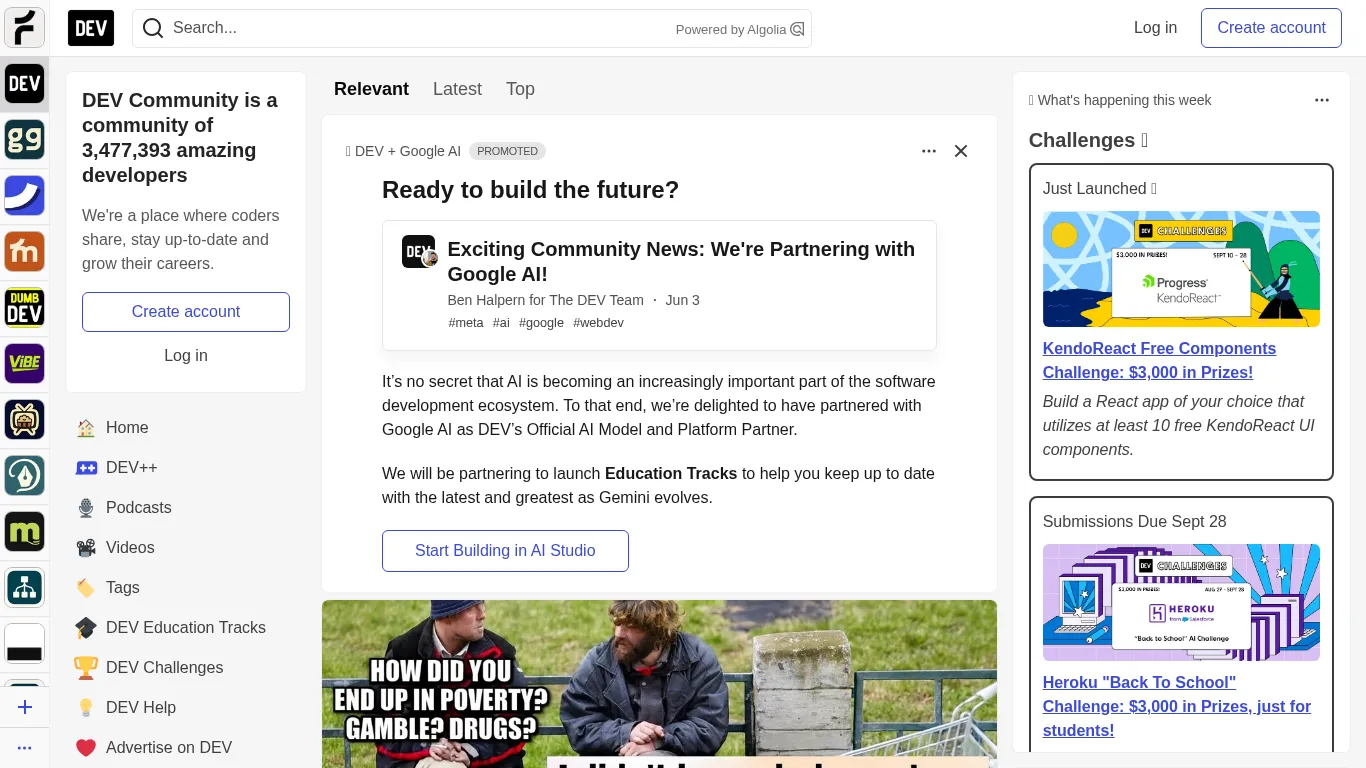
Product URL: https://dev.to
DEV is a community-first platform where developers publish Markdown posts, tag topics, and reach a built-in audience. It’s a strong Hashnode alternative if your priority is distribution, feedback, and participation in the developer ecosystem.
Why it’s a Hashnode alternative
Similar community-first discovery with tags, reactions, and follow graphs
Standout features for developers
Markdown + code syntax; built‑in audience of developers; org accounts
Best for
Individual engineers and teams prioritizing reach and feedback over full brand control
Potential drawbacks
Limited branding/control vs running your own site; domain authority accrues to DEV
How to get started
Create a profile or org; publish Markdown posts; use relevant tags for visibility
Key specs (consistent table across all tools)
Hosting model | Editor format | Community distribution | Custom domain | Integrations | Pricing model |
|---|---|---|---|---|---|
Fully hosted community platform | Markdown with code blocks | Strong built‑in network via tags, reactions, follows | No (publishes under dev.to) | Embeds, org accounts, RSS | Free (with community features) |
5) Medium - Simple publishing with large built‑in readership

Product URL: https://medium.com
Medium offers a clean, distraction‑free writing experience and a massive built‑in audience. For developer content, publications and topic tags can drive meaningful reach with minimal setup - making it a straightforward alternative to Hashnode when you want exposure fast.
Why it’s a Hashnode alternative
Easy, distraction‑free writing with network effects and curation
Standout features for developers
Clean editor, publications for extra reach, highlightable code blocks
Best for
Thought leadership and story‑driven technical content
Potential drawbacks
Limited SEO control/branding; authority accrues to Medium; monetization tied to ecosystem
How to get started
Join or pitch relevant publications; syndicate canonical links from your main blog
Key specs (consistent table across all tools)
Hosting model | Editor format | Community distribution | Custom domain | Integrations | Pricing model |
|---|---|---|---|---|---|
Fully hosted publishing network | Rich editor with code formatting | Strong built‑in readership via publications/tags | Limited (Medium‑hosted) | Embeds, canonical syndication | Free to publish; paid membership for readers |
6) Webflow - Visual CMS with developer‑grade control
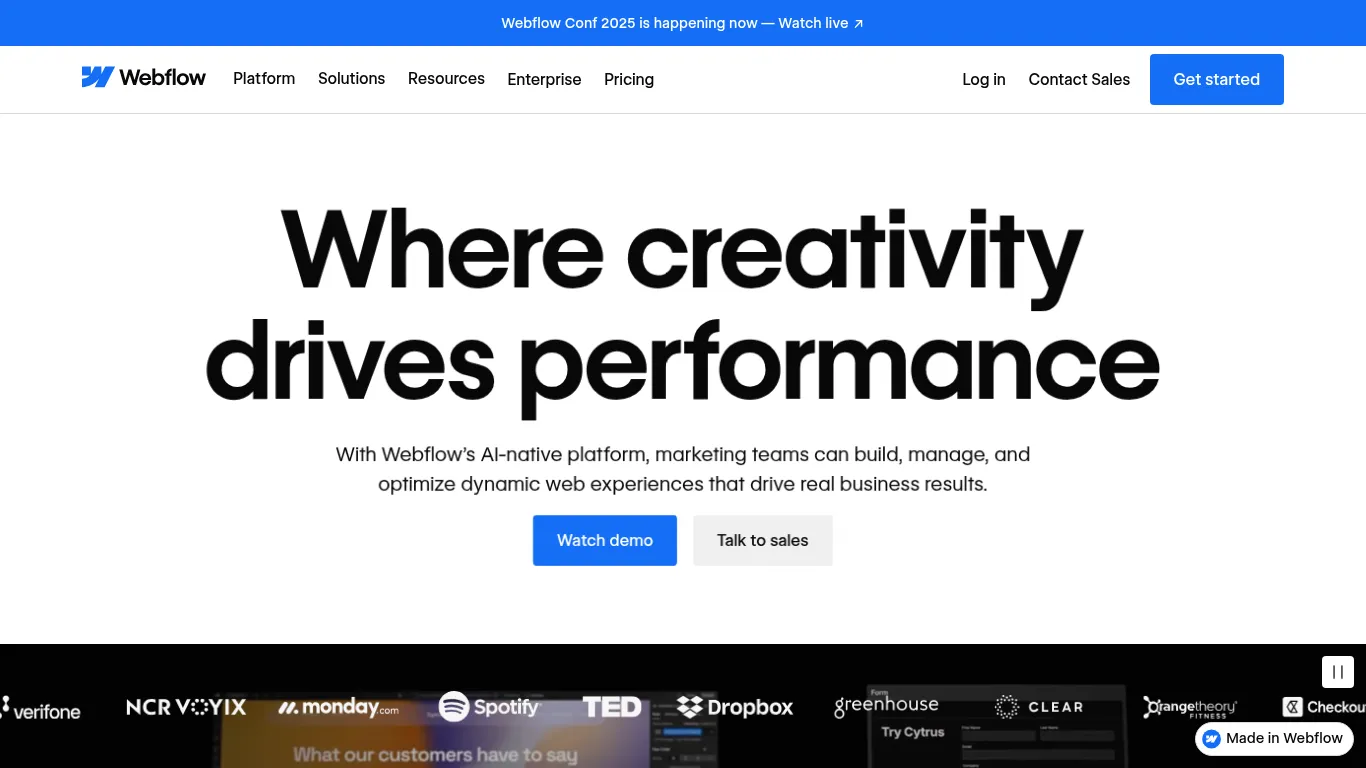
Product URL: https://webflow.com
Webflow gives design‑savvy teams pixel‑perfect control without writing templates by hand. Build a custom, fast blog with semantic output, robust SEO settings, and a composable CMS - then publish to a custom domain on a global CDN.
Why it’s a Hashnode alternative
Build a custom, fast blog without code while keeping CSS/structure control
Standout features for developers
Semantic, clean output; CMS Collections; robust SEO settings; fast hosting/CDN
Best for
Design‑savvy teams who want pixel‑perfect layouts and strong SEO
Potential drawbacks
Learning curve for complex CMS models; fewer dev‑specific widgets vs WP plugins
How to get started
Use a blog CMS template; configure Collections (posts, authors, tags); publish to custom domain
Key specs (consistent table across all tools)
Hosting model | Editor format | Community distribution | Custom domain | Integrations | Pricing model |
|---|---|---|---|---|---|
Fully hosted SaaS (global CDN) | Visual designer + CMS editor; custom code embeds | None built‑in; rely on SEO/RSS | Yes | Integrations via embeds, API, and automation tools | Subscription (CMS/Business/Enterprise tiers) |
7) Jekyll - Git‑based static blogs for developers
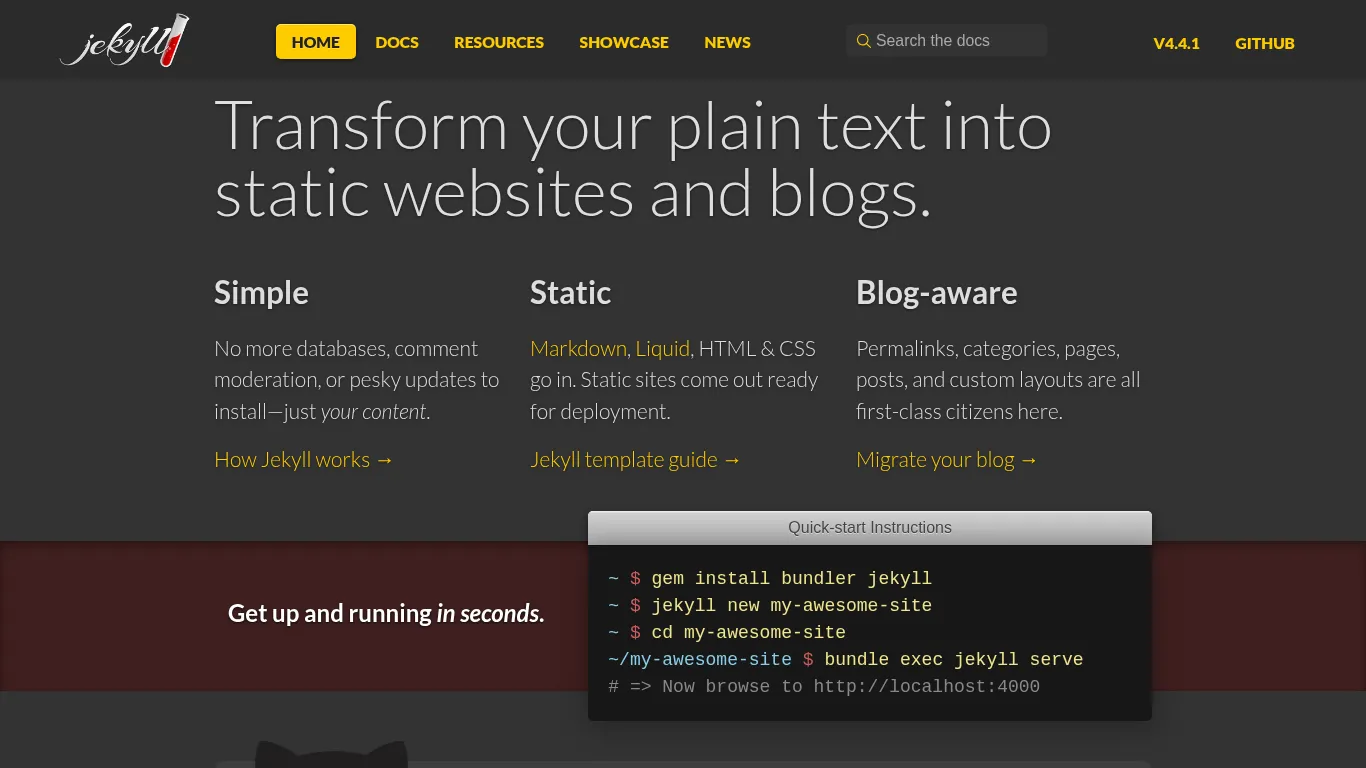
Product URL: https://jekyllrb.com
Jekyll is a classic static site generator built for Markdown and Git workflows. With Liquid templates, themeable layouts, and free GitHub Pages hosting, it’s a developer‑favorite Hashnode alternative when you want a minimal, fast, and fully portable stack.
Why it’s a Hashnode alternative
Own your stack with a Markdown + Git workflow; deploy anywhere
Standout features for developers
Static output, Liquid templates, GitHub Pages support; huge community of themes
Best for
Engineers comfortable with Git/CLI who want a minimal, fast stack
Potential drawbacks
No dynamic features by default; search/comments require services/integration
How to get started
Fork a theme/starter; write in Markdown; deploy to GitHub Pages/Netlify with CI
Key specs (consistent table across all tools)
Hosting model | Editor format | Community distribution | Custom domain | Integrations | Pricing model |
|---|---|---|---|---|---|
Static (host anywhere: GitHub Pages, Netlify, Vercel, S3) | Markdown + Liquid templates | None built‑in; rely on SEO/RSS | Yes | Plugins, CI/CD, third‑party search/comments | Open‑source (free); hosting costs optional |
8) Hugo - Blazing‑fast static site generator
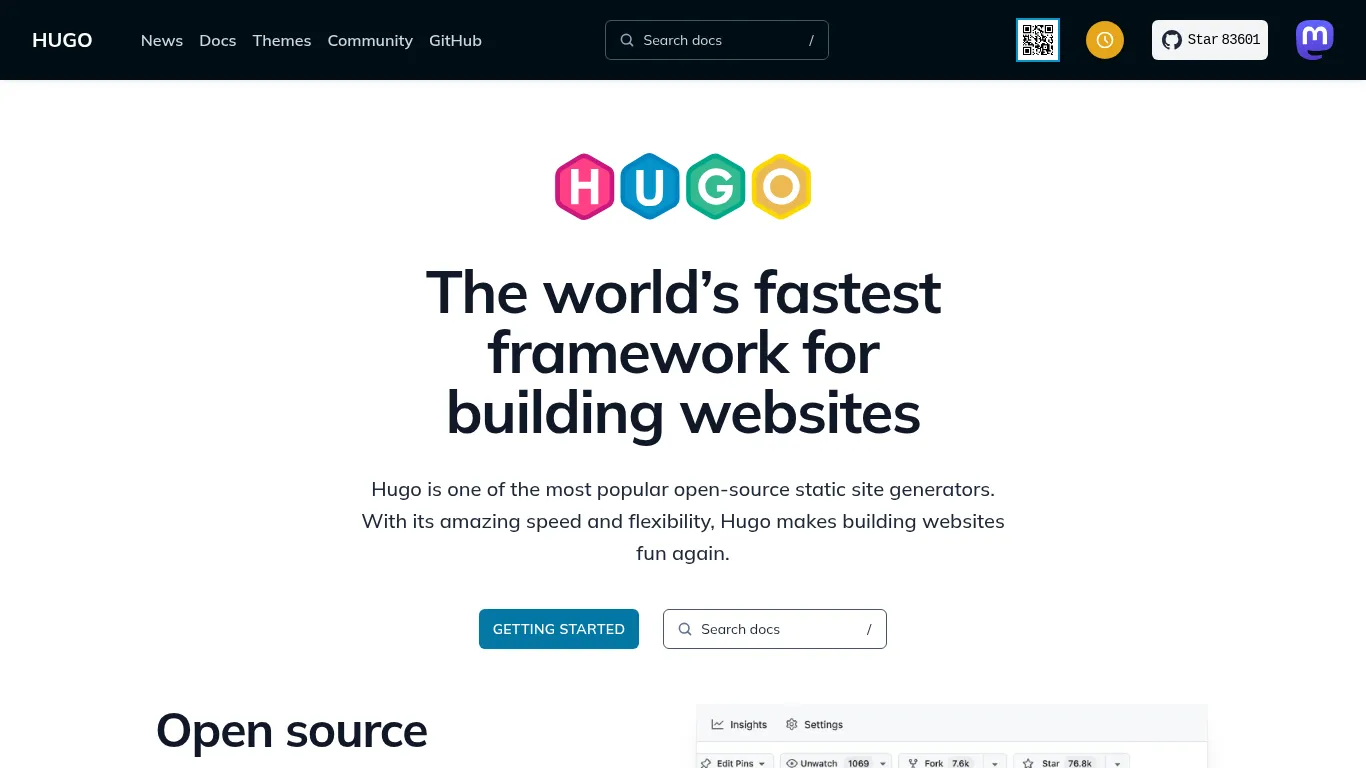
Product URL: https://gohugo.io
Hugo is a high‑performance static site generator known for lightning‑fast build times and a straightforward Markdown workflow. With powerful templating, taxonomies, and image processing, it’s a great Hashnode alternative for content‑heavy technical blogs that need speed without complexity.
Why it’s a Hashnode alternative
Lightning build times and simple Markdown workflow for content‑heavy sites
Standout features for developers
Single binary; templating; taxonomies; image processing; strong theme library
Best for
Large technical blogs needing speed and scale with minimal complexity
Potential drawbacks
Templating can be confusing for beginners; no plugin system (work via modules)
How to get started
Choose a theme; add content in Markdown; deploy via Netlify/Vercel/CDN
Key specs (consistent table across all tools)
Hosting model | Editor format | Community distribution | Custom domain | Integrations | Pricing model |
|---|---|---|---|---|---|
Static (deploy anywhere: Netlify, Vercel, S3, Cloudflare) | Markdown + Go templates | None built‑in; rely on SEO/RSS | Yes | Modules, shortcodes, CI/CD, image pipeline | Open‑source (free); hosting costs optional |
9) Gatsby - React‑based SSG with rich plugin ecosystem
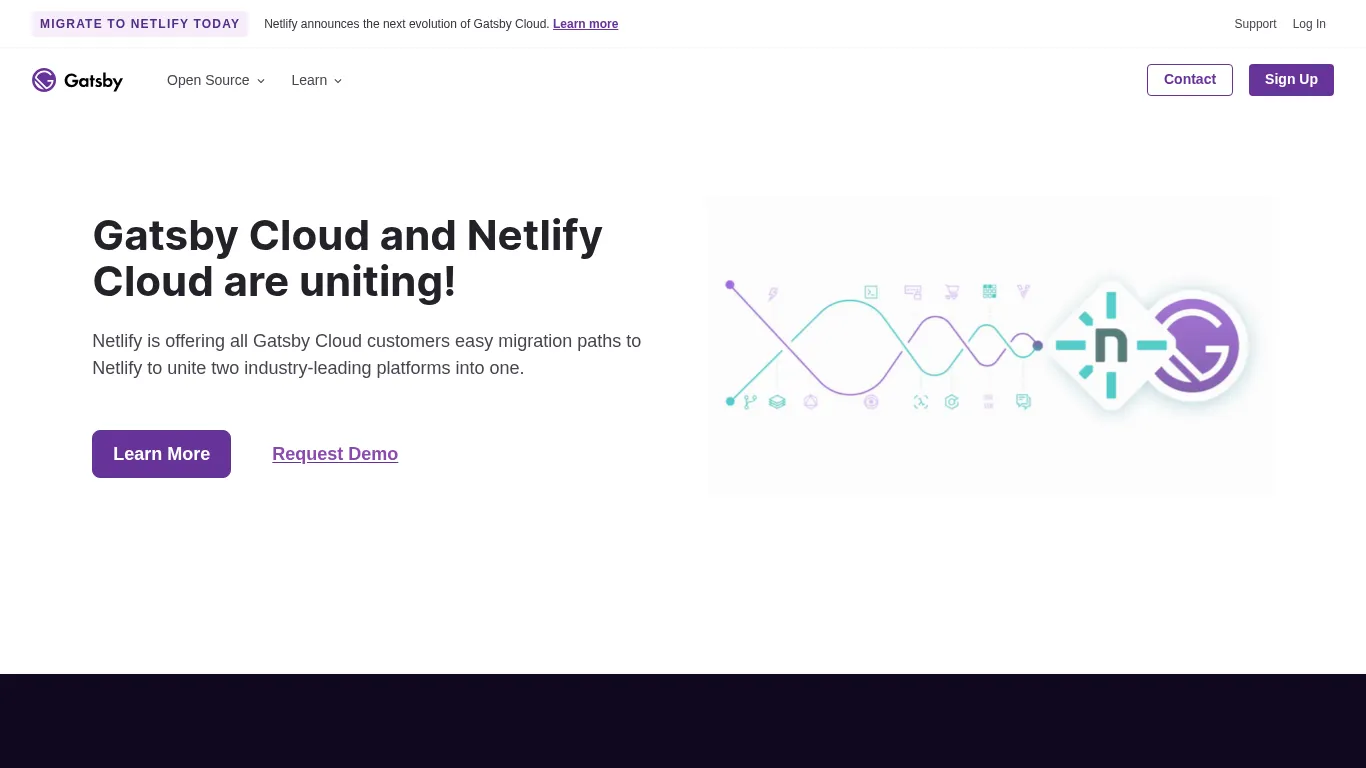
Product URL: https://www.gatsbyjs.com
Gatsby brings a modern React developer experience to content sites, with a unified GraphQL data layer, image optimization, and deploy‑anywhere flexibility. It’s a strong Hashnode alternative if your team wants component‑driven UI, robust SEO, and the ability to mix CMS/data sources cleanly.
Why it’s a Hashnode alternative
Modern, component‑driven dev experience with strong SEO and performance
Standout features for developers
GraphQL data layer; image optimization; extensive starters/plugins; SSR/DSG options
Best for
React teams building content sites with custom components and workflows
Potential drawbacks
Build performance and search on large sites require tuning; steeper learning curve
How to get started
Start from a blog starter; configure source/transformer plugins; deploy on modern hosting
Key specs (consistent table across all tools)
Hosting model | Editor format | Community distribution | Custom domain | Integrations | Pricing model |
|---|---|---|---|---|---|
Static/SSR/DSG deploy anywhere (Netlify, Vercel, etc.) | Markdown/MDX; React components | None built‑in; rely on SEO/RSS | Yes | Rich plugin ecosystem; GraphQL sources; Functions | Open‑source (free); hosting costs optional |
10) Publii - Desktop app for secure static blogs

Product URL: https://getpublii.com
Publii is a desktop CMS that lets you write locally and publish static sites directly to your host/CDN. With multiple editors, built‑in image optimization, and simple deployments to Netlify, S3, or FTP, it’s a low‑maintenance Hashnode alternative for solo developers.
Why it’s a Hashnode alternative
Local desktop CMS that publishes static sites to your host/CDN
Standout features for developers
Multiple editors, image optimization, Netlify/S3 deployments, versioning
Best for
Solo devs who want an offline editor and simple static publishing
Potential drawbacks
Less extensible than code‑first SSGs; workflow tied to the desktop app
How to get started
Install the desktop app; pick a theme; connect hosting target; publish
Key specs (consistent table across all tools)
Hosting model | Editor format | Community distribution | Custom domain | Integrations | Pricing model |
|---|---|---|---|---|---|
Static publishing to your host/CDN (Netlify, S3, FTP, etc.) | Visual editor, Markdown, code highlighter | None built‑in; rely on SEO/RSS | Yes | Image pipeline, Handlebars themes, deploy targets | Open‑source (free); hosting costs optional |
11) Feather - Notion‑to‑blog with newsletters

Product URL: https://feather.so
Feather turns Notion pages into an SEO‑friendly blog and newsletter with minimal setup. Map fields, connect a custom domain or subfolder, and publish - perfect for teams living in Notion who want a low‑friction developer blog plus built‑in email.
Why it’s a Hashnode alternative
Extremely simple publishing via Notion with custom domain and SEO controls
Standout features for developers
Write in Notion; auto‑publish to blog; subfolder support; built‑in email
Best for
Teams living in Notion who want a low‑friction technical blog + newsletter
Potential drawbacks
Layout/theming flexibility is more constrained than a full CMS/SSG
How to get started
Connect Notion; map a domain/subfolder; configure SEO; publish your first post
Key specs (consistent table across all tools)
Hosting model | Editor format | Community distribution | Custom domain | Integrations | Pricing model |
|---|---|---|---|---|---|
Fully hosted SaaS (edge‑served) | Write in Notion; SEO controls in Feather | None built‑in; rely on SEO/RSS/email | Yes - domains and subfolders | Notion, email/newsletter, analytics | Subscription (usage‑based tiers) |
12) Docusaurus - Docs‑first, blog‑included for developer products

Product URL: https://docusaurus.io
Docusaurus is a React‑based static site generator optimized for documentation with a first‑class blog plugin. It’s ideal when your developer blog, docs, tutorials, and release notes need to live together in one versioned, MDX‑powered stack.
Why it’s a Hashnode alternative
Perfect for teams that need a docs site and a blog in one React‑based stack
Standout features for developers
Markdown MDX, versioned docs, sidebar generation, i18n, search integrations
Best for
API/platform teams publishing product docs, tutorials, and release notes
Potential drawbacks
Docs‑centric theming; requires Git/Node workflow and CI for publishing
How to get started
Scaffold with the CLI; enable the blog plugin; deploy to Vercel/Netlify/GitHub Pages
Key specs (consistent table across all tools)
Hosting model | Editor format | Community distribution | Custom domain | Integrations | Pricing model |
|---|---|---|---|---|---|
Static (deploy anywhere: Vercel, Netlify, GitHub Pages) | Markdown/MDX in Git; React components | None built‑in; rely on SEO/RSS | Yes | Algolia search, plugins, CI/CD, i18n | Open‑source (free); hosting costs optional |
Overall comparison table
Platform | Hosting model | Editor (Markdown/code) | Community distribution | Custom domain | Ideal for | Pricing model |
|---|---|---|---|---|---|---|
BlogBowl | Fully hosted SaaS (global CDN) | Rich editor + AI; Markdown/code | None built‑in; SEO, newsletter, RSS | Yes (domains and subfolders) | SaaS teams/startups needing AI‑driven growth | Subscription |
WordPress (self‑hosted) | Self‑hosted (choose provider + CDN) | Block editor; Markdown via plugins; code/syntax plugins | None built‑in; rely on SEO/RSS | Yes | Teams needing full SEO control and complex IA | Open‑source; hosting + premium add‑ons |
Ghost | Self‑hosted or Ghost(Pro) | Markdown; code‑friendly; themeable | None built‑in; newsletters/SEO | Yes | Technical publications with memberships/newsletters | Open‑source or subscription |
DEV Community (dev.to) | Fully hosted community platform | Markdown with code blocks | Strong built‑in network via tags/follows | No (publishes under dev.to) | Individuals/teams prioritizing reach and feedback | Free |
Medium | Fully hosted publishing network | Clean editor with code formatting | Built‑in readership via publications/tags | Limited (Medium‑hosted) | Thought leadership and story‑driven content | Free to publish; reader membership |
Webflow | Fully hosted SaaS (global CDN) | Visual designer + CMS; custom code embeds | None built‑in; rely on SEO/RSS | Yes | Design‑savvy teams wanting pixel‑perfect layouts | Subscription (CMS/Business/Enterprise) |
Jekyll | Static (host anywhere; GitHub Pages/Netlify) | Markdown + Liquid templates | None built‑in; rely on SEO/RSS | Yes | Engineers comfortable with Git/CLI; minimal fast stack | Open‑source; hosting optional |
Hugo | Static (deploy anywhere: Netlify/Vercel/CDN) | Markdown + Go templates | None built‑in; rely on SEO/RSS | Yes | Large technical blogs needing speed and scale | Open‑source; hosting optional |
Gatsby | Static/SSR/DSG deploy anywhere | Markdown/MDX + React components | None built‑in; rely on SEO/RSS | Yes | React teams building custom component workflows | Open‑source; hosting optional |
Publii | Static publishing to your host/CDN | Visual editor, Markdown, code highlighter | None built‑in; rely on SEO/RSS | Yes | Solo devs wanting offline editor + simple publishing | Open‑source; hosting optional |
Feather | Fully hosted SaaS (edge‑served) | Write in Notion; SEO controls in platform | None built‑in; SEO/RSS/email | Yes (domains and subfolders) | Teams living in Notion; blog + newsletter | Subscription (usage‑based) |
Docusaurus | Static (deploy anywhere: Vercel/Netlify/GitHub Pages) | Markdown/MDX in Git; React components | None built‑in; rely on SEO/RSS | Yes | API/platform teams with docs + blog | Open‑source; hosting optional |
Conclusion - Pick the right Hashnode alternative for your goals
Choosing the right developer blogging platform comes down to your goals, workflow, and how much control you need. Here’s a quick guide to help you decide:
If you want community distribution: DEV Community, Medium (syndication)
If you want full control + scale: WordPress, Ghost, Webflow
If you prefer code‑first stacks: Hugo, Jekyll, Gatsby, Docusaurus
If you want extreme simplicity: BlogBowl (AI automation), Feather, Publii
Call to action: Launch your technical blog faster with BlogBowl’s AI‑powered workflows and SEO‑ready templates - then syndicate selectively to communities for extra reach.


